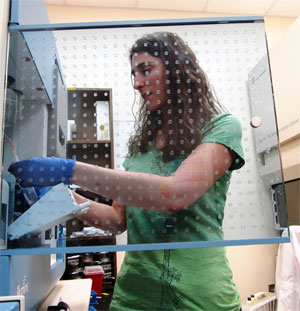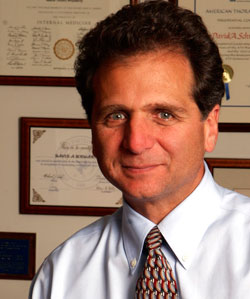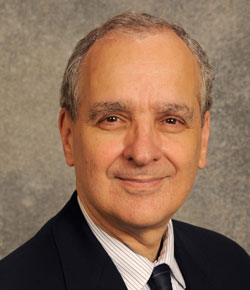Medicine Gets Personal at CU
Genetic Fingerprints Can Guide Diagnosis and Treatment
By Dan Meyers
 (May 2012) The patient required higher than expected doses of the drug warfarin to prevent clotting. Matt Taylor, MD, was concerned: Was the unusual dose caused by genetic factors or by the temporary use of another medication that was interacting with the warfarin?
(May 2012) The patient required higher than expected doses of the drug warfarin to prevent clotting. Matt Taylor, MD, was concerned: Was the unusual dose caused by genetic factors or by the temporary use of another medication that was interacting with the warfarin?
If the patient went off the other medication, and if that other drug was the issue, her warfarin dose could be too high, potentially causing bleeding complications.
Taylor, an associate professor at the CU School of Medicine and director of the Adult Medical Genetics Program, used genetic testing to figure it out. He looked for DNA sequence differences in two genes that can guide dosing—CYP2C9 and VKORC1. The results argued against her genetic makeup causing the high warfarin dose. The patient now knew that when she went off the other drug she likely would need to reduce her warfarin.
It’s just one example of the growing realm of personalized medicine. From cancer to pulmonary fibrosis, cardiology to clotting, a person’s genes often can predict disease, confirm a diagnosis or guide treatment.
“Personalized medicine is not new but it is accelerating,” says David Schwartz, MD, chair of the Department of Medicine at the University of Colorado School of Medicine. “It may take a while but it’s going to explode and represents one of our next opportunities. It will have a profound effect in terms of clinical trials and treatments. The care of some of our most complex patients will be decided by their molecular attributes.”
 Schwartz and others caution that while personalized medicine means medical advances it also raises new ethical questions that will have to be carefully addressed.
Schwartz and others caution that while personalized medicine means medical advances it also raises new ethical questions that will have to be carefully addressed.
The school of medicine and CU are moving into personalized medicine in a number of ways, both institutional and individual. A new center is planned to help support research; researchers are exploring personalized medicine; it’s being used for treatment and it’s part of the students’ curriculum.
One institutional step involves biomedical informatics—the ability to collect lots of clinical and biological data and crunch it.
Dr. Richard Krugman, dean of the medical school and vice chancellor of health affairs for the University of Colorado Denver, says that expanding biomedical informatics capability is a crucial step to competing in the research environment of the future.
“To do that, we will create two units,” Krugman says, “an academic division in the Department of Medicine and a center that will support the collection and analysis of the vast amounts of data that are the foundation of personalized medicine.”
The center will be housed in the Office of the Vice Chancellor for Health Affairs.
Already, personalized medicine is blossoming at CU:
 Last January, the FDA approved
Last January, the FDA approved a treatment for cystic fibrosis pioneered by Dr. Frank Accurso, a pediatrics professor with the CU medical school. In the past, doctors only could treat the complications caused by CF. A decade ago, scientists learned that a defect in the protein CFTR causes cystic fibrosis. Accurso led the clinical trial that showed the new treatment, using the drug Kalydeco, helps about 4 percent of CF patients by targeting the mutation. He hopes as many as 90percent will eventually benefit.- In the past, about a third of patients with a suspicious thyroid nodule couldn’t be sure from tissue analysis whether they had cancer. In those cases, patients often had their thyroid removed, just to be sure. Research led by CU’s Bryan Haugen, MD, head of the endocrinology division, helped show that a test of 167 genes could make the call on cancer and spare many patients the cost, risk
and discomfort of surgery. (See story on facing page). - Ross Camidge, MD, director of the Thoracic Oncology Clinical Program at University of Colorado Cancer Center and an associate professor of the medical school, is helping a subset of lung cancer patients with a mutation called anaplastic lymphoma kinase (ALK). ALK is a strong indicator that the drug
crizotanib will, for a time at least, shrink or stabilize tumors in 90 percent of patients. In general, personalized medicine has had a large impactin the cancer field. “One-size-fits-all treatments are yesterday’s paradigm,” Camidge says. “This is personalized medicine.” - Researchers led by a team from National Jewish Health peered into the genes of 82 families with a history of pulmonary fibrosis. They found a common variation near the MUC5B gene, associated with mucus formation, that greatly increases the risk of pulmonary fibrosis in individuals, regardless of family history of the disease. The risk variant of MUC5B results in excess lung mucus; mucus is a benefit to the lungs unless there’s too much of it. This discovery gives science a new, genetic target for research aimed at finding a cure for the now-fatal disease. Schwartz, the Department of Medicine chair, was senior author of the paper on the findings.
- Karl Lewis, MD, helped demonstrate that for the half of metastatic melanoma patients with the genetic BRAF V600 mutation, there was significant benefit from the drug Vemurafenib. With the drug, survival more than doubled from about 6 months to 15.9 months. Lewis, an investigator at the CU Cancer Center and associate professor at the School of Medicine, notes that until a year and a half ago, no effective drug existed for metastatic melanoma — the most dangerous form of skin cancer. The BRAF V600 mutation signals a cell to grow without bounds. Vemurafenib is a BRAF inhibitor. For metastatic melanoma patients with a BRAF mutation “This represents a new standard of care,” says Lewis, one of the authors of a Vemurafenib study published in February in the New England Journal of Medicine.
Future doctors grapple with personalized medicine as part of their medical school training. In CU’s interprofessional ethics course, for example, students wrestle with tricky ethical questions arising from genetic testing. Personalized medicine is covered in lectures about cancer.
And Taylor, the doctor who tested for warfarin-related genetic variations, gives a lecture to medical students about pharmacogenetics: using genetic variations to guide drug therapy. Taylor tells his students that researchers have estimated that adverse drug reactions (which include more than genetically driven problems) are the fourth to
This striking conclusion motivates researchers and doctors to move away from “one-size-fits-all” prescribing, Taylor says, to find ways of tailoring treatments to avoid adverse events and maximize health.
Personalized medicine is an interesting term. Much of medicine, after all, is “personal.”
But nine years after completion of the Human Genome Project, health care is entering a transformative realm by using “an individual’s genetic profile to guide decisions,” in the words of the National Human Genome Research Institute.
Personalized medicine is seeping into our culture. It has gained a “nearly cult-like following” in popular media, Steve Nissen, with the Cleveland Clinic, recently wrote in the Journal of the American Medical Association. His essay called for “the same scrutiny required of all therapeutic advances—careful evaluation through well-designed randomized clinical trials.”
Several companies now will analyze a person’s genes for a fee of a few hundred dollars. The topic has even hit television comedy. In the show 30 Rock, one character asks a quack physician, “When they check my DNA, will it tell what diseases I might get, or help me to remember my ATM pin code?”
The TV doctor’s answer: “Absolutely. Science is whatever we want it to be.”
It’s a joke, of course, but also a reminder that personalized
There are other questions as well—ethical issues, being discussed in CU classrooms and across the country, about
What would result if all fetuses were tested for a range of genetic traits that inevitably would find harbingers of medical trouble? Imagine when that knowledge collides with the abortion debate. What if routine, broad genetic analysis began to unearth paternity surprises? What policies should guide a future society that can find and fix problematic genes or even enhance average ones?
Meanwhile, the research continues and is likely to grow at the school of medicine. Schwartz says the goal is to apply that research to help patients.
“The biggest problem is not developing the knowledge but understanding how these new insights about